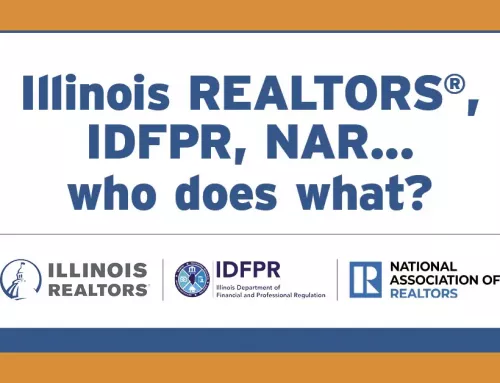As a listing broker, may I purchase my own listing?
The safest answer to this question is “NO.”
A listing broker is in a very vulnerable position when they choose to buy a client’s listing. In addition, there is a violation of the Illinois Real Estate License Act dual agency prohibition when the broker is both the buyer and the agent for the seller. Not only is this prohibited by law, but the appearance is bad because a listing broker may be perceived to be taking advantage of an unlicensed seller by buying the seller’s listing. In such cases, if the listing broker has some compelling reason to buy their client’s property, that broker needs to take steps to protect themselves from allegations by a seller who may feel “wronged” after selling their house to their listing agent.
If a listing broker believes they MUST buy their own listing, they should adhere to the following cautionary guidelines:
- Give up the listing and refer seller to their own attorney, appraiser and/or a new agent.
- Do not take a commission.
- Have your attorney draft a release for seller’s signature that the seller will not complain about the transaction at a later date.
- Check your errors and omissions insurance policy to see if the transaction would be covered in the event of a complaint from the seller.
- Brokerages should consult with their legal counsel on this issue to determine an office policy prohibiting their listing agents from buying their own listings, unless certain safeguards are met, and the listing is terminated prior to negotiating a purchase.
Might an “agreement” over a text exchange or direct messaging (DM) between licensees create a binding real estate contract?
This area of the law is still developing, but in certain situations courts have found agreements made through texts to be enforceable. Since the pandemic began, informal means of communication have become a more common way of doing business in the real estate industry. There are likely many reasons for this, including working remotely, maintaining social distancing from clients during the last couple years, increasing the use of virtual showings and creating more virtual brokerage offices. This trend toward making agreements through more informal channels is likely to continue.
In Illinois, a contract is generally determined to be legally binding if a party made an offer to do something in exchange for consideration from the other party, and the offer was accepted by the other party. These are the three elements of a contract: (1) offer; (2) acceptance; and (3) consideration. In addition, for the sale of real estate there must be a sufficient writing under the Statute of Frauds for the contract to be enforceable in court. Until recently, in Illinois it would be presumed that an exchange of terms, and an agreement over text message could not be an enforceable real estate contract due to the requirement for a sufficient writing. However, if there is anything the past year has taught us, nothing should be presumed, and based upon some recent case law in other states, licensees should be more cautious about how they are negotiating by text or DM.
For example, in 2019, a New York State court found that a text exchange agreement between a landlord and a tenant was an enforceable contract. (See Karaduman v. Grover (Ithaca City Ct. 2019)). In that case, a plaintiff signed a lease for a property sight unseen (a familiar scenario post-pandemic), but upon arriving at the property found the premises to be in poor condition and not as described in the advertising. The plaintiff did not take possession of the property but notified the landlord that she would be willing to forgo a portion of her original security deposit and expected a return of funds and a cancellation of her lease. The defendant landlord agreed to plaintiff’s proposal over the text exchange, but then reneged on his promise to return the deposit. The court ruled in favor of the plaintiff, stating that “text messages are recognized by courts as having the import of letters and emails” and therefore, the plaintiff has the right to rely on the agreement reached between the parties.
In Massachusetts, a court upheld the validity of a contract for sale of land based upon text messages exchanged between the brokers for the parties, finding that the content of messaging signified an intent to be bound. (St. John’s Holdings LLC v. Two Electronics, LLC (Mass. Land Ct. 2016)). The parties in that case, through their respective brokers (who had both been designated to have authority to legally bind their clients), exchanged unsigned letters of intent via email. The seller’s broker subsequently sent the buyer’s agent a text message asking that the buyer sign the final letter of intent, and specifically stated that the seller was ready to commit to the agreement. The buyer signed and deposited an earnest money check, but in the interim, the seller received a more favorable offer from a third party and then refused to sign the returned letter.
After the buyer filed suit to enforce the agreement, the seller argued that because the Statute of Frauds required that a contract for the sale of land be signed by the party who was to be bound, the prospective buyer’s claim should be dismissed. The Court refused to dismiss the claim, finding that the text message at issue did constitute a signed writing under the Massachusetts Statute of Frauds, and was sufficient to bind the seller to the agreement. The Massachusetts Court held that the text message exchange, when read in context with the email exchanges, contained sufficient terms to meet the signed writing requirement of the Statute of Frauds and bind the parties.
So far, Illinois, courts have not moved in the direction of the decisions above, but licensees should be cautious in wording text exchanges during negotiations. It is likely that brokerages will continue to use these informal means of communication to negotiate transactions. Precautions can be taken to make certain that the intentions of the parties are not misunderstood when conducting a business transaction via text, email or other less formal means of communication like DMs. For example, licensees should consider including language in any text exchange that any agreement is not a binding contract until reduced to writing and signed by the parties.
Brokerages might consider consulting with their legal counsel about the most appropriate phrasing to be included in text messages to signify an intent that their clients not be bound by the communication and educating licensees on the issue. However, if the market remains “hot,” clients might actually want a binding agreement via text or DM. If this is the case, specific direction should come from the client to the broker after clients have consulted with their attorneys.



















